
Planning & Assessing Business Needs
The evaluation of company requirements and planning is an essential first step in the successful implementation of Zoho CRM. The first step in this process is to determine the business's problems, objectives, and particular needs. Businesses can customize their CRM to meet their specific sales and customer management demands by developing a thorough grasp of the current obstacles and planned outcomes. In addition, putting together a committed project team and assigning adequate funding are crucial for a successful execution. Throughout the process, this team will offer the essential knowledge, organization, and assistance.
Also, it's crucial to establish a precise implementation schedule and identify significant checkpoints. It not only makes sure that activities are finished in the allotted time, but it also gives a roadmap so that stakeholders can be brought into alignment and the implementation's success can be measured. Businesses can stay on track, track their progress, and eventually accomplish a seamless adoption with the help of a clearly defined timeline and milestone.
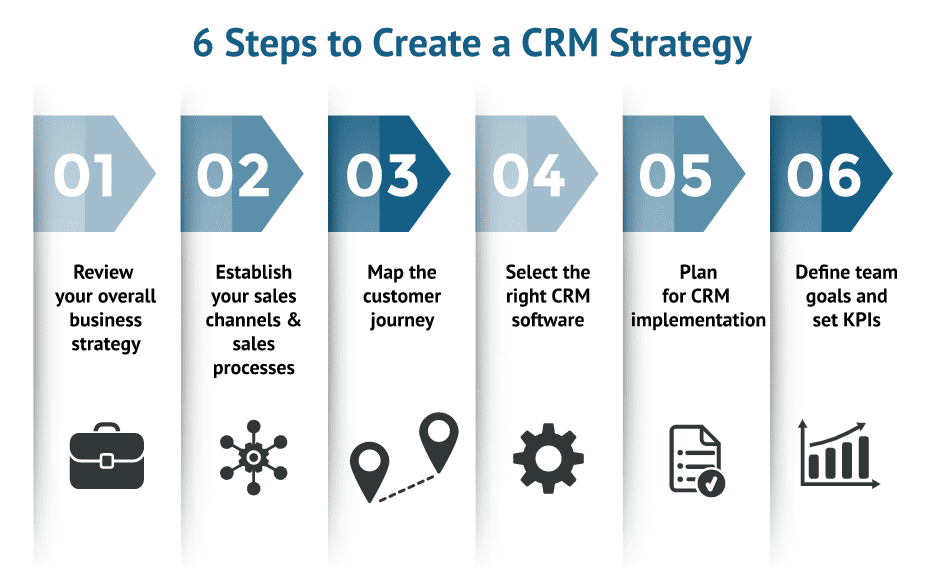
Configuring Zoho CRM
- Define your objectives and map out your sales and customer management processes
- Set up user roles and permissions to control access to data and ensure data security
- Customize modules and fields to align with your specific business requirements, capturing the information that is most relevant to your operation
- Create personalized views and reports to gain valuable insights into your sales pipeline, customer interactions, and performance metric
- Take advantage of automation features, such as workflow rules and email templates, to streamline your processes and save time
- Integrate Zoho CRM with other applications, such as email and calendar tools, to enhance collaboration and improve efficiency. Regularly review and optimize your configuration as your business evolves
- Continuously train and engage your team to ensure proper adoption and utilization of the CRM system
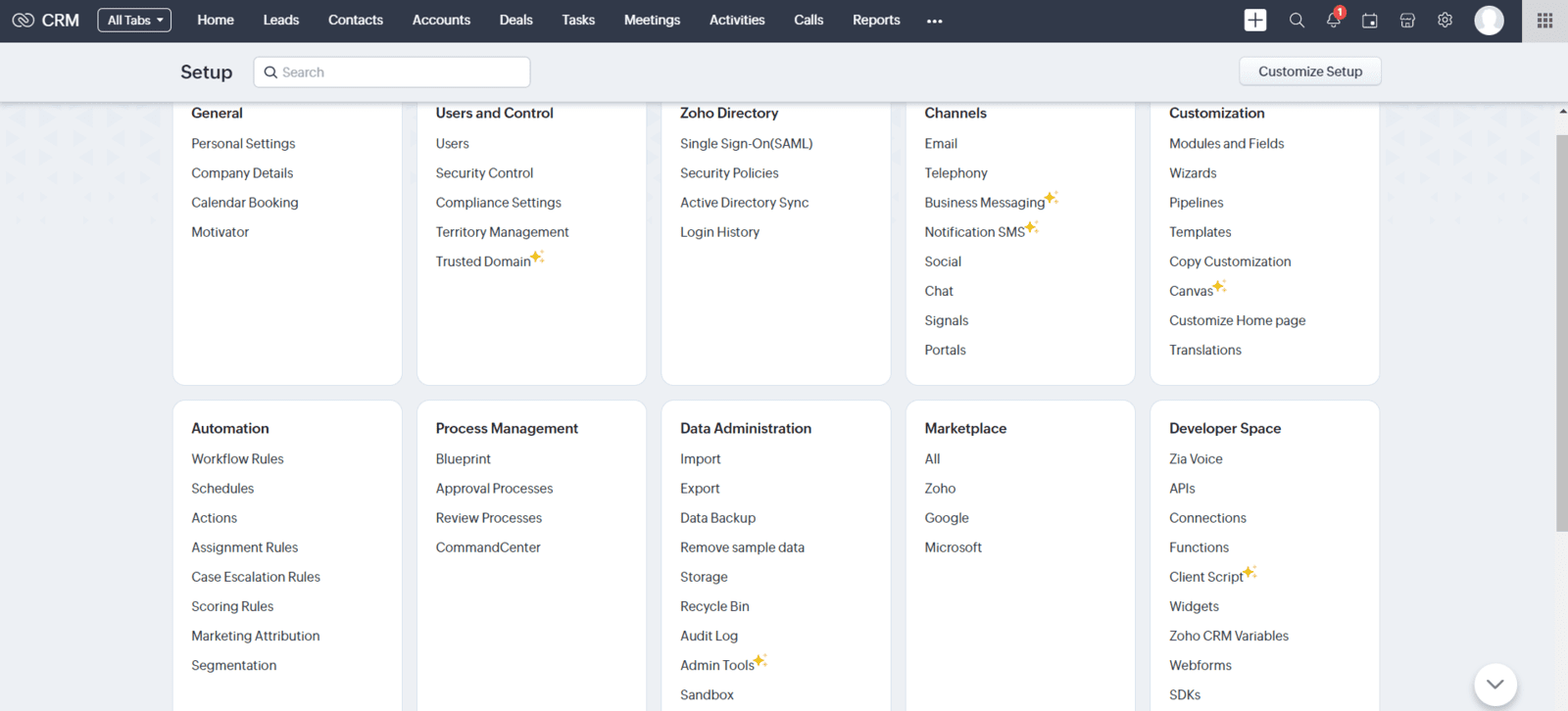
Data Import & Integration
Data import and integration play a crucial role because it ensures a seamless transition and maximizes the efficiency of your customer management processes. The first step in data import is to prepare your existing data for migration. This involves cleansing and organizing your data, removing duplicates, and ensuring data consistency and accuracy. Zoho CRM provides tools and templates to facilitate this process and streamline data preparation. Once your data is ready, you can import using various methods such as manual data entry, CSV file upload, or API integration. Mapping fields between your existing data and the corresponding fields in CRM's is essential to ensure proper data alignment and integrity.
Integration with other applications is another critical aspect of data management. Integration capabilities include popular email providers, calendar tools, and marketing automation platforms. Integrating your email and calendar systems allows for seamless communication and synchronization of appointments, ensuring that you have a complete view of customer interactions within the CRM. This integration eliminates the need for manual data entry, reducing the risk of errors and saving time. Integrating Zoho CRM with marketing automation tools enables effective lead nurturing and campaign management. It enables the automatic transfer of lead information from the products, ensuring a smooth transition and cohesive customer journey. This integration allows you to track and analyze campaign effectiveness, measure lead conversions, and gain valuable insights into your marketing efforts. Under marketplace, you can find various third-party and zoho integrations that can extend your system's capabilites.
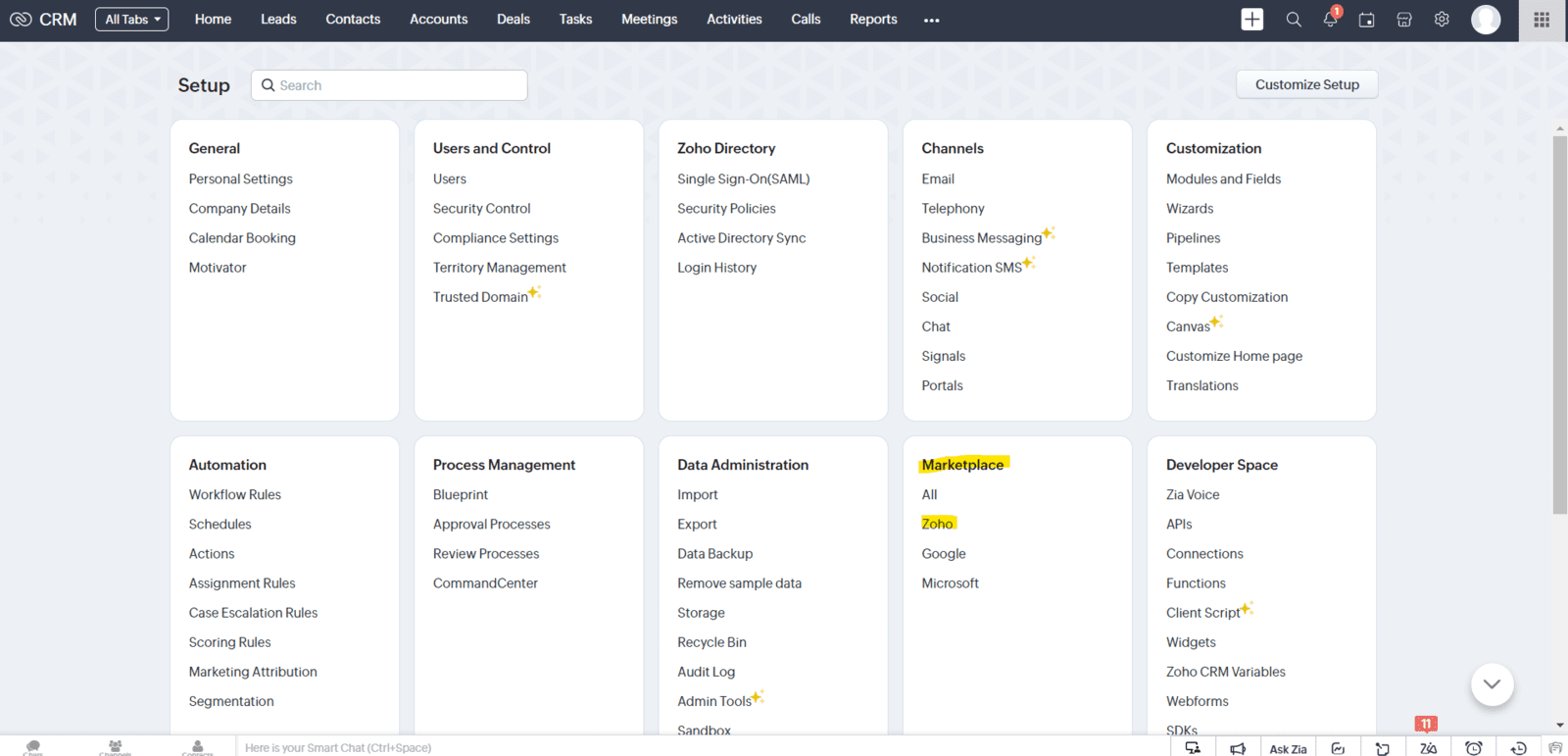
It's important to note that data import and integration are ongoing processes. As your business evolves, you may need to regularly update and synchronize your data to ensure its accuracy and relevancy. Zoho CRM provides robust data import and integration features that allow you to automate data syncing, set up scheduled imports, and establish real-time data integration with other systems.
To ensure a successful data import and integration process, it's essential to plan and test the process thoroughly. Take time to review and validate the imported data, checking for any discrepancies or missing information. Create a backup of your data before initiating the import process, ensuring you have a fallback option in case of any issues. Additionally, consider seeking professional assistance or utilizing support resources to ensure a smooth and error-free data import and integration.
By effectively managing data import and integration in Zoho CRM, you can consolidate your customer information, streamline workflows, and gain a holistic view of your business relationships. This integration empowers you to make informed decisions, improve customer engagement, and drive growth in your organization.
Continuous Optimization
Continuous optimization and improvement are key factors in harnessing the full potential of a CRM system and ensuring its long-term success in your organization, providing several tools and features that enable businesses to continually refine their sales and customer management processes.
One way to achieve continuous optimization is by regularly analyzing CRM data and generating insightful reports. Zoho CRM offers a range of pre-built reports and customizable dashboards that provide visibility into crucial metrics such as sales performance, lead conversion rates, and customer engagement. By regularly reviewing these reports, businesses can identify trends, pinpoint areas for improvement, and make data-driven decisions to enhance their sales strategies.
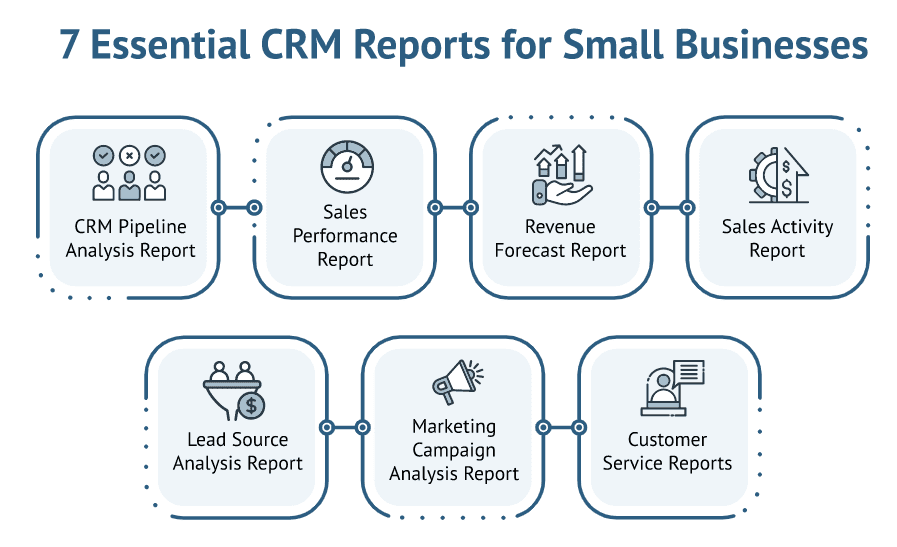
Tracking key performance indicators (KPIs) is another essential aspect of continuous optimization with Zoho CRM. By defining and monitoring KPIs specific to your business objectives, you can evaluate the effectiveness of your sales and customer management efforts. This allows you to set targets, measure progress, and gain insights into areas that require attention. Whether it's tracking conversion rates, average deal size, or customer retention, monitoring KPIs empowers you to focus on the metrics that matter most to your business.
Zoho CRM's flexibility and customization options enable businesses to adapt and optimize their CRM processes over time. As your business evolves, you can make adjustments to workflows, custom fields, automation rules, and reports. This flexibility ensures that your CRM system remains aligned with your evolving business needs, supporting your unique sales processes and customer management strategies.
This system also provides regular updates and enhancements to improve the user experience and introduce new features. Staying informed about these updates and taking advantage of new functionalities can further optimize your CRM implementation. Zoho's active user community and support resources are valuable in providing guidance, best practices, and tips for continuous improvement.
By leveraging the analytical capabilities, KPI tracking, customization options, and regular updates, businesses can achieve continuous optimization and improvement. This iterative approach ensures that your CRM implementation remains aligned with your evolving business goals, enables you to maximize the benefits and positions your organization for ongoing growth and success.
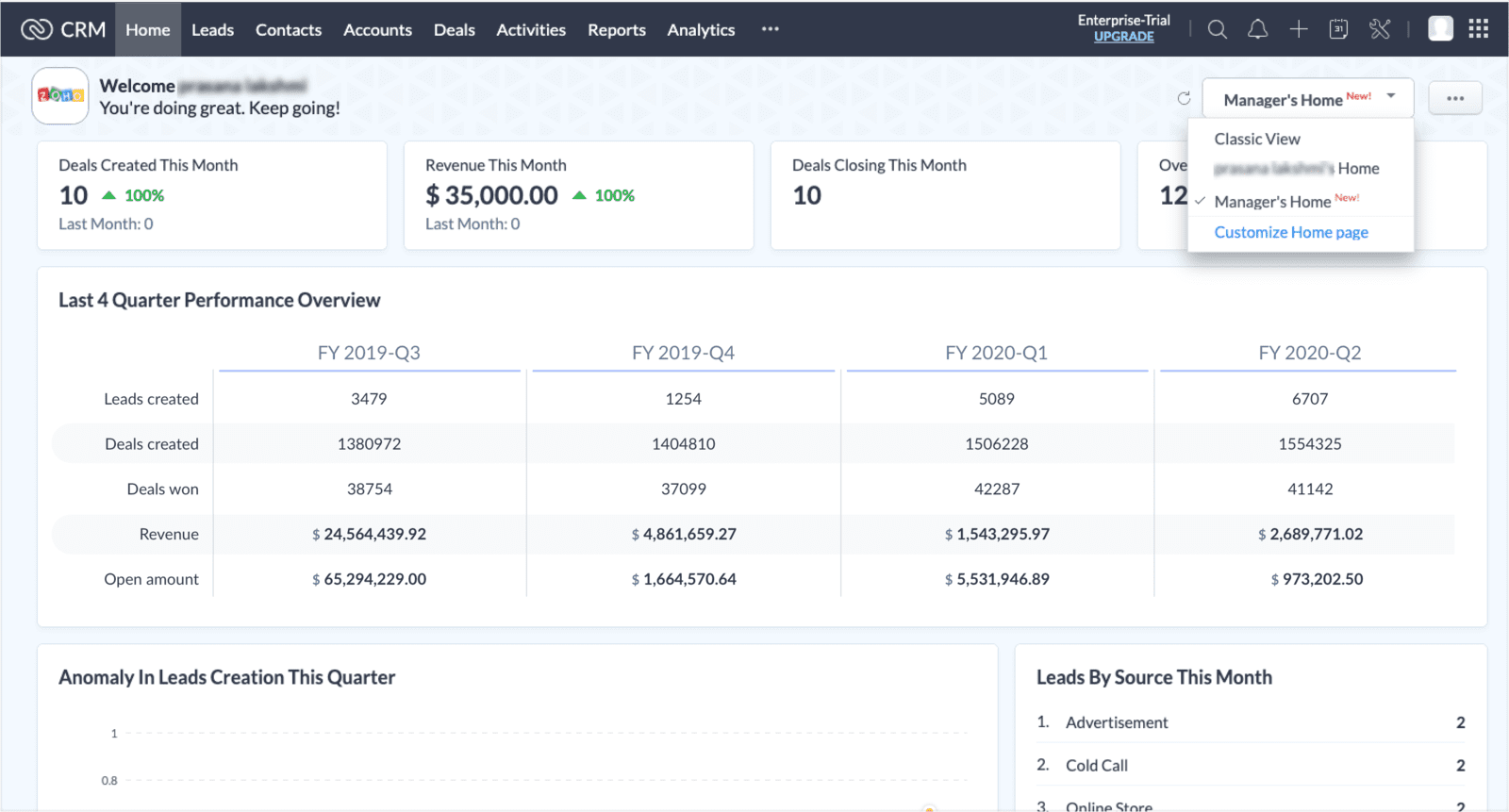
Security & Data Privacy
Ensuring security and data privacy is of paramount importance to safeguard sensitive customer information and maintain compliance with data protection regulations. Zoho CRM offers robust features and best practices to help businesses achieve a high level of data security. By following the measures and best practices below, businesses can create a secure environment for their customer data and demonstrate their commitment to data privacy. This builds trust with customers, mitigates the risk of data breaches, and ensures compliance with applicable regulations.
One way to enhance security is by configuring data access controls and permissions. Administrators can define user roles and assign appropriate access levels to ensure that employees can only view and manipulate data relevant to their job responsibilities. By implementing a least privilege approach, businesses can minimize the risk of unauthorized access to sensitive information.
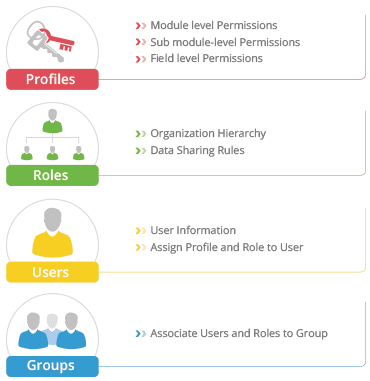
Zoho CRM also provides encryption protocols to protect data transmission and storage. Data transmitted over the network is encrypted using industry-standard SSL/TLS protocols, ensuring secure communication between users and the CRM system. Also, it employs encryption at rest, which means that data stored within the CRM system is encrypted to protect against unauthorized access. To further strengthen data privacy, Zoho adheres to various compliance standards and regulations, such as GDPR (General Data Protection Regulation) and CCPA (California Consumer Privacy Act). These compliance measures help businesses meet their legal obligations and ensure that customer data is handled with care.
Achieving data privacy in Zoho CRM requires ongoing vigilance and adherence to best practices. Regularly updating user passwords, implementing multi-factor authentication, and educating employees on data security protocols are crucial steps. It is also important to keep the CRM system up to date with the latest updates, patches, and enhancements provided by Zoho. Businesses should regularly review and audit user access and permissions to ensure that they align with current roles and responsibilities. Conducting periodic security assessments and penetration testing can help identify vulnerabilities and address them proactively.

